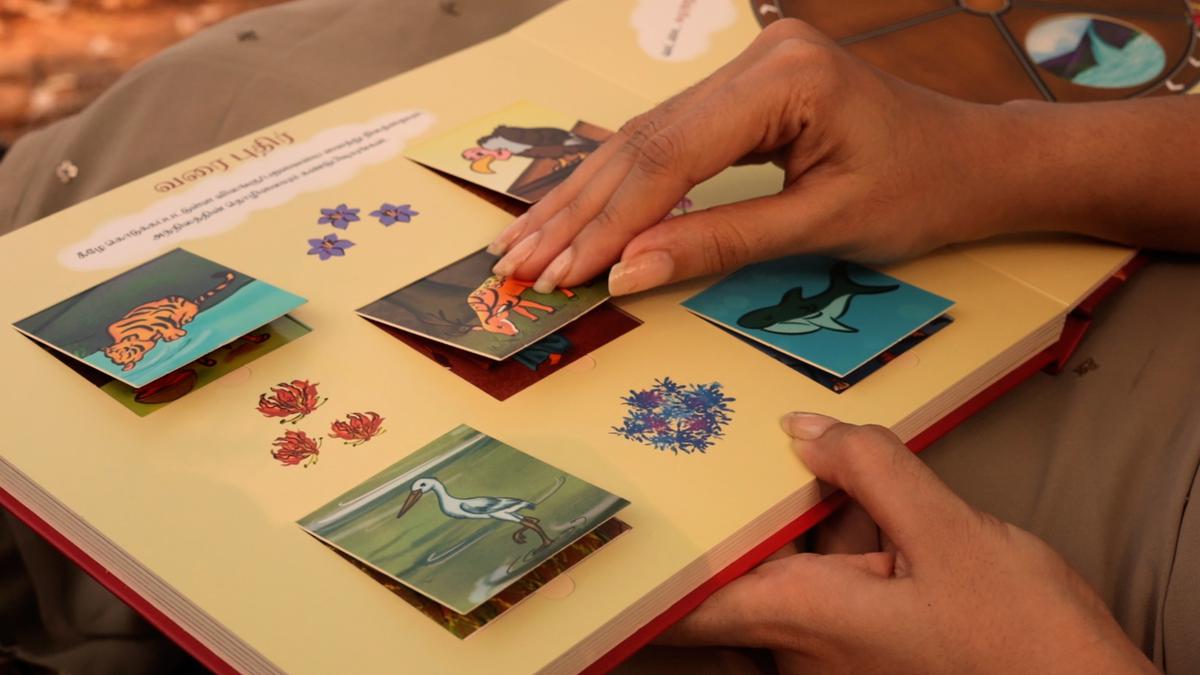
Interactive Tamil boardbooks for children: This publishing startup presents a quirky take on popular tales
The Hindu
Interactive Tamil boardbooks for children
The popular story of the grandma who sold vadai now has an interesting twist. Perhaps one of the most narrated, reproduced, and illustrated Tamil children’s stories of all time, it is now available as an interactive boardbook. Agan Adhigaram, a publishing startup by Chengalpattu-based husband-and-wife duo Ramya Karthikeyan and D Sethuram, has brought out this story with push, pull, and slide mechanisms aimed at helping little fingers develop the pincer grasp. The publishing house recently brought out its second title I, also an interactive boardbook.
Agan is the result of Ramya and Sethuram’s search for Tamil boardbooks for their son, who is now three. “We have been reading to him from the time he was a baby, but found that most good quality boardbooks for children were in English,” says 32-year-old Ramya, who is an automobile engineer. She and her husband Sethuram, who is good at drawing, hence came up with something on their own for their child.
“We picked the popular paati vada sutta kadhai, added colourful illustrations, and came up with Vadai Poche, that was first published in 2022,” says Ramya. The book, that they actually printed for their son, caught the attention of their friends, and soon, the couple made more copies, eventually starting their own publishing house.
Their latest title I is based on the five Tamil landscapes Kurinji, Mullai, Marudham, Neithal, and Paalai. “Many of us who studied Tamil in school know these landscapes from an academic point of view. We wanted to make this fun and interactive for children,” says Ramya. The book features the slider mechanism on the cover and comes with lift-the-flap add-ons on every spread. It has pictures of the flora and fauna of the various landscapes, depicting the kind of work people living there did, the food they ate, water resources found, among other aspects.
Ramya adds that I has been put together by referencing Sangam texts such as Tholkappiam and Silappathikaram. “The title stands for the way children express a sense of awe, as well as for ‘five’, that denotes the landscapes,” explains Ramya adding that the book was launched two weeks ago by Tamil lyricist Madhan Karky and his wife and podcaster Nandini Karky in Chennai.
Sethuram, who is an automobile engineer himself, has now quit his corporate job to focus on their publishing house. Their next book is in the works. Ramya says that is a humourous story that will feature their original illustrations.
For details, visit them on Instagram @agan_adhigaram

“Writing, in general, is a very solitary process,” says Yauvanika Chopra, Associate Director at The New India Foundation (NIF), which, earlier this year, announced the 12th edition of its NIF Book Fellowships for research and scholarship about Indian history after Independence. While authors, in general, are built for it, it can still get very lonely, says Chopra, pointing out that the fellowship’s community support is as valuable as the monetary benefits it offers. “There is a solid community of NIF fellows, trustees, language experts, jury members, all of whom are incredibly competent,” she says. “They really help make authors feel supported from manuscript to publication, so you never feel like you’re struggling through isolation.”

Several principals of government and private schools in Delhi on Tuesday said the Directorate of Education (DoE) circular from a day earlier, directing schools to conduct classes in ‘hybrid’ mode, had caused confusion regarding day-to-day operations as they did not know how many students would return to school from Wednesday and how would teachers instruct in two modes — online and in person — at once. The DoE circular on Monday had also stated that the option to “exercise online mode of education, wherever available, shall vest with the students and their guardians”. Several schoolteachers also expressed confusion regarding the DoE order. A government schoolteacher said he was unsure of how to cope with the resumption of physical classes, given that the order directing government offices to ensure that 50% of the employees work from home is still in place. On Monday, the Commission for Air Quality Management in the National Capital Region and Adjoining Areas (CAQM) had, on the orders of the Supreme Court, directed schools in Delhi-NCR to shift classes to the hybrid mode, following which the DoE had issued the circular. The court had urged the Centre’s pollution watchdog to consider restarting physical classes due to many students missing out on the mid-day meals and lacking the necessary means to attend classes online. The CAQM had, on November 20, asked schools in Delhi-NCR to shift to the online mode of teaching.









